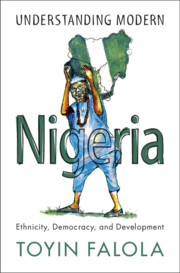Book contents
- Understanding Modern Nigeria
- Understanding Modern Nigeria
- Copyright page
- Dedication
- Contents
- Figures
- Maps
- Preface
- Acknowledgments
- Part I Introduction
- Part II Context and History
- Part III Democracy and Governance
- Part IV Development Crises
- Part V Reforms and Revolutions
- 19 Change Agents: Youths and Politics
- 20 Hashtags and Social Protests: Reformation and Revolution in the Age of Social Media
- 21 Reformist Option: Grassroots and Political Activism
- 22 Revolutionary Option: Social Movements and Power to the Citizens
- 23 Nationalist Ethos, Collective Reformation, and Citizenry Power
- 24 Popular Culture and Politics
- Part VI Conclusion
- Bibliography
- Index
21 - Reformist Option: Grassroots and Political Activism
from Part V - Reforms and Revolutions
Published online by Cambridge University Press: 09 June 2021
- Understanding Modern Nigeria
- Understanding Modern Nigeria
- Copyright page
- Dedication
- Contents
- Figures
- Maps
- Preface
- Acknowledgments
- Part I Introduction
- Part II Context and History
- Part III Democracy and Governance
- Part IV Development Crises
- Part V Reforms and Revolutions
- 19 Change Agents: Youths and Politics
- 20 Hashtags and Social Protests: Reformation and Revolution in the Age of Social Media
- 21 Reformist Option: Grassroots and Political Activism
- 22 Revolutionary Option: Social Movements and Power to the Citizens
- 23 Nationalist Ethos, Collective Reformation, and Citizenry Power
- 24 Popular Culture and Politics
- Part VI Conclusion
- Bibliography
- Index
Summary
“Reformist Option: Grassroots and Political Activism” situates grassroots or community power as the locus of the democratic essence. Through these parts, it engages the narrative of Nigeria focusing on the existing grassroots structures and their formation; it suggests how grassroots efforts can work in a global comparative context while identifying possible ways to move the country forward as it is a mobilizing tool operating from a bottom-up approach, rather than a top-down one, to implement policies, effect change, and drive development. A combination of poor education, repression from the military years, and the unconscious perception that politicians are untouchable prevent the people from revolting against poor governance. These, coupled with factors like corruption, ambiguous division of power, citizen apathy, and political patronage systems have turned the beneficial concept of grassroots governance on its head, and benefits to the citizens are severely limited. However, through participative governance, the citizenry can be empowered and re-energized to make active commitments and contributions toward achieving collective growth and sustainable development. This active political engagement helps to emphatically reject poor governance, which would allow disciplined and visionary leaders, and an active and involved populace, to work together for relevant socioeconomic projects that improve the country's indices in all sectors and improve the welfare of its citizens.
- Type
- Chapter
- Information
- Understanding Modern NigeriaEthnicity, Democracy, and Development, pp. 510 - 538Publisher: Cambridge University PressPrint publication year: 2021

